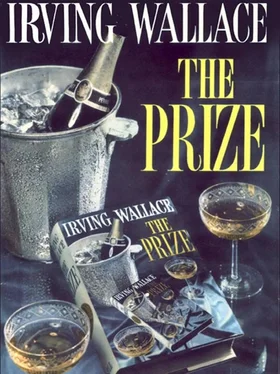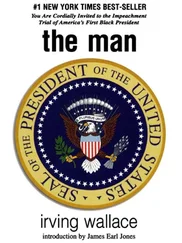‘Despite the necessity of the ageing process, do you not think too many old authors are given the prize?’ asked the Dagens Nyheter man. ‘Many of us believe Alfred Nobel meant his prize money to help the struggling and promising young, and did not want it wasted on the advanced in years who are usually secure and perhaps no longer productive. Nobel once said, “As a rule, I’d rather take care of the stomachs of the living than the glory of the departed.” Another time, he said that he wanted “to help dreamers, for they find it hard to get on in life.” Do not these statements imply an interest in aiding younger artists who lack means?’
‘I hope so,’ said Craig with amusement, ‘I hope that is what Nobel wanted-for, by your standards, I am young-and, by my standards, l lack means.’
The Dagens Nyheter man would not be put off. ‘Then why do our committees pour all their funds into the laps of old men who do not need it? The first seven literary winners averaged seventy years of age! Anatole France was seventy-seven when he doddered in here for the Ceremony and cheque; and his countryman, André Gide, was seventy-eight. Sir Winston Churchill was seventy-nine. Why does our Swedish Academy do this? I do not think it is fair. We wish your opinion, Mr. Craig.’
‘It comes down to the purpose of the award,’ said Craig carefully, ‘and that was not defined by Nobel and has never been clear since. I’m not sure I agree that the handling of the literary award is as unfair as you imply. I don’t think age should be the issue at all-only merit-and older writers, proved writers, generally have more merit and deserve more honours. This may be playing it safe, true enough. But honouring younger men, simply because they are younger and promising, may be equally unfair. They may not improve, may not endure-indeed, may retrogress. I have heard that your Academy considers Sinclair Lewis a case in point. I’m no Pollyanna, and I’m not given to toadying, but all things considered, I think your Swedish Academy is doing the right thing. I’m sorry I can’t agree with you, but that’s how I feel. Call the Nobel Prize in literature an old-age pension, if you will, but I think that is better than turning it into a young man’s subsidy.’ He might not receive the most sympathetic write-up from the Dagens Nyheter , he told himself, but it did not matter. His attention was diverted to someone else’s upraised hand. ‘Yes?’
The young male correspondent, with the short-cropped beard, was standing. He introduced himself as representing Sweden’s Bookseller Magazine .
‘Mr. Craig, past winners of the literary award, in recent years, have often stated-whether out of honesty or modesty-that they were less deserving than some of their contemporaries. Sinclair Lewis, in his public speech here-that was back in 1930-felt that James Branch Cabell, Willa Cather, Theodore Dreiser, Upton Sinclair, all were Americans more deserving of the Nobel Prize than he. Six years later, when Pearl Buck was notified of our award, she called it incredible and ridiculous, and stated that the honour really belonged to Dreiser. In 1954, Ernest Hemingway said that Carl Sandburg, Bernard Berenson, or Isak Dinesen should have had the award before him. Three years later, Albert Camus said, “Had I been on the Swedish jury, I would have voted for Malraux.” This brings us to Andrew Craig. What other author alive would you consider as deserving as, or more deserving than, yourself of the honour you are receiving here?’
Craig struggled with his conscience briefly. Leah had begged him not to derogate himself. But honesty forbade evasion or silence. Yet he hated to name names. There were so many. Well, without fully exposing his inferiority, why not complete candour?
‘I cannot name one author more deserving than I-because there are half a hundred who should have this prize before me. There are at least ten in the United States, perhaps fifteen in England and France, several in Japan, and many more elsewhere. I can think of several in Scandinavia, certainly one right here in Sweden.’
‘Would you name Sweden’s candidate?’ asked the young man from Bookseller Magazine .
‘I’m reluctant to name names-second-guess your Academy-but I will say that I’ve read two novels by your Gunnar Gottling, and for all his irreverence, explicit sexuality, crudity, he is a major talent.’
‘He does not qualify in certain areas.’
‘Well, I don’t know the facts,’ said Craig, ‘and I have no wish to argue in favour of authors who should be here in my place. You asked if there were others that I thought should be here in my stead, and I said yes. I’m sure no author can ever be certain that he alone, above all others, deserves the world’s highest literary compliment. Nor, I am sure, can any annual award satisfy the entire public.’
The Svenska Dagbladet reporter had risen. ‘Mr. Craig, I suppose you are acquainted with our Nobel machinery? Former Nobel winners are allowed to nominate. French and Spanish and other recognized Academies are allowed to nominate. Professors of literature in universities are allowed to nominate. And, of course, our own Swedish Academy has given itself eligibility to nominate. These nominations are submitted in person or by cable or by letter. I am sure you know all of this-’
‘No,’ said Craig truthfully, ‘I had no idea of all these formal preliminaries.’
‘Of course, I am leading up to a question,’ said the Svenska Dagbladet reporter. ‘Please bear with me a moment longer. Early in 1950, I am informed, there were over one hundred nominations for the literary prize from abroad. Many were from America, and not one included the name of William Faulkner, of Oxford, Mississippi. Consequently, our own Swedish Academy nominated Mr. Faulkner, and then voted him the prize for 1949, which had been held open. I am also informed, from an excellent source, that you won your prize in the very same fashion. Did you know that?’
‘I had not heard it, no.’
‘You were not nominated by your fellow countrymen in America or any other nation abroad. You were nominated right here in Stockholm, by our Swedish Academy, who then later voted you the prize.’
‘Again, I can only say I am grateful-now doubly so.’
‘The point I am leading up to is-why was it left for a Swedish jury, so far from your homeland, to introduce your name? In short, why are you so neglected-unappreciated, I should say-in your native America?’
Craig shook his head. ‘You’ve posed a tough question. Well, I’ll do my best. For years, Faulkner was relatively obscure because his admirable Yoknapatawpha County was obscure-in the eyes of critics and public alike. Happily, your Swedish jury, with the insight of distance, found him less so. My output has been relatively neglected, in my own country, for similar reasons.’
‘Obscurity?’
‘Yes, I think so. I write about the present, but I write about the present in terms of the past. Most Americans have been conditioned to believe that historical fiction should be romantic and escapist. To them I am an odd duck, out of joint with time. My historical fiction does not fit the popular mould. It is neither romantic nor escapist, but puzzlingly realistic, and touches their contemporary lives. It worries them. It confuses them. They find my method obscure, and they turn their backs on it. For some reason, which is a mystery to me, your Swedish jurors understood what I was doing and admired it. I was fortunate to find understanding an ocean and half a land away from where I live.’
The London Spectator man was on his feet. ‘Mr. Craig, you were especially cited for The Perfect State and Armageddon . The Academy called them “writings in support of humanitarian ideals”. Can you elucidate, in your own words, the humanitarian ideals these two novels represent?’
Читать дальше












